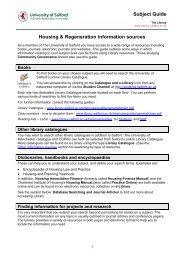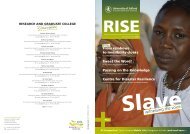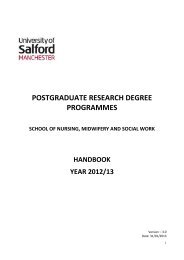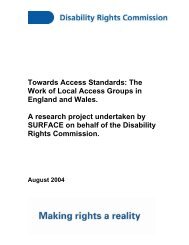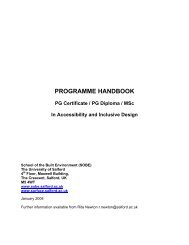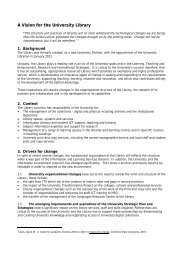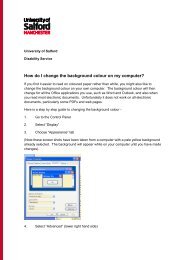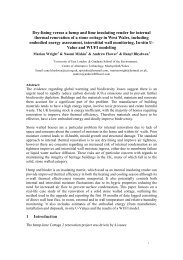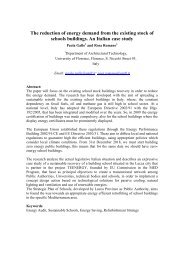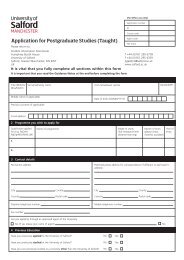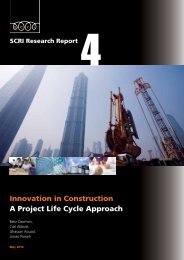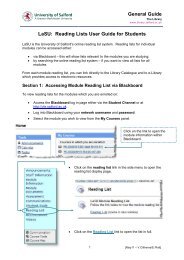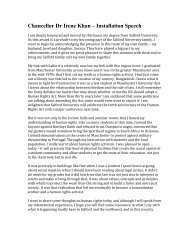2006 Annual Report - University of Salford
2006 Annual Report - University of Salford
2006 Annual Report - University of Salford
You also want an ePaper? Increase the reach of your titles
YUMPU automatically turns print PDFs into web optimized ePapers that Google loves.
Corporate Governance Statement<br />
<strong>Annual</strong> <strong>Report</strong> &<br />
Financial Statements<br />
constituted with written terms <strong>of</strong> reference and specified<br />
membership, including a significant proportion <strong>of</strong> lay<br />
members (from whom the Chairman is selected). The<br />
Finance Committee inter alia recommends to the Council<br />
the <strong>University</strong>’s annual revenue and capital budget and<br />
monitors performance in relation to the approved budgets.<br />
The Remuneration Committee determines the remuneration<br />
<strong>of</strong> the Vice-Chancellor and the Registrar and Secretary and<br />
sets the remuneration policy for senior staff.<br />
10. The <strong>University</strong> maintains a register <strong>of</strong> interests <strong>of</strong> members<br />
<strong>of</strong> the Council and Senior Officers, which may be<br />
consulted by arrangement with the Registrar and<br />
Secretary. The Statutes <strong>of</strong> the <strong>University</strong> specify that the<br />
Registrar and Secretary should act as Secretary <strong>of</strong> the<br />
Council. Any enquiries about the constitution and<br />
governance <strong>of</strong> the <strong>University</strong> should be addressed to the<br />
Registrar and Secretary.<br />
7. The Audit Committee meets at least three times a year, with<br />
the <strong>University</strong>’s external and internal auditors in attendance.<br />
The Committee considers detailed reports together with<br />
recommendations for the improvement <strong>of</strong> the <strong>University</strong>’s<br />
systems <strong>of</strong> internal control and management’s responses<br />
and implementation plans. It also receives and considers<br />
reports from the Higher Education Funding Council for<br />
England as they affect the <strong>University</strong>’s business and<br />
monitors adherence to the regulatory requirements. Whilst<br />
Senior Officers attend meetings <strong>of</strong> the Audit Committee as<br />
necessary, they are not members <strong>of</strong> the Committee and the<br />
Committee has power to meet the external auditors or<br />
internal auditors for independent discussions.<br />
8. As Principal Officer <strong>of</strong> the <strong>University</strong>, the Vice-Chancellor<br />
exercises considerable influence upon the development <strong>of</strong><br />
strategy, the identification and planning <strong>of</strong> new<br />
developments and the shaping <strong>of</strong> the ethos <strong>of</strong> the<br />
institution. The Pro-Vice-Chancellors and the Senior Officers<br />
who comprise the Executive Group all contribute in various<br />
ways to this aspect <strong>of</strong> the institution, but the ultimate<br />
responsibility for what is done rests with the Council. The<br />
Executive Group and the Audit Committee receive regular<br />
reports from the internal auditors, which include<br />
recommendations for improvement.<br />
9. The <strong>University</strong> has embarked on a comprehensive review <strong>of</strong><br />
its committee and management structures and this work<br />
will continue in <strong>2006</strong>-07 with a view to introducing revised<br />
arrangements in 2007-08.<br />
29



